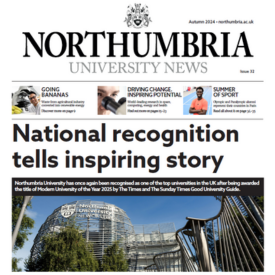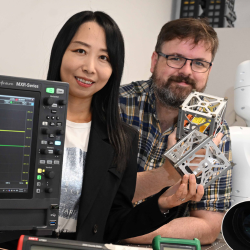-
Study
-
Undergraduate
- Search for a Course
- Undergraduate Open Day & Events
- Application Guides
- Northumbria University UCAS Exhibitions
- Foundation Years
- Undergraduate Fees & Funding
- School & College Outreach
- Continuing Professional Development
-
Postgraduate
- Postgraduate Study Degree
- Postgraduate Research Degrees
- Postgraduate Open Days and Events
- Postgraduate Fees & Funding
- Flexible Learning
- Thinking about a Masters?
- Continuing Professional Development
- Change Direction
-
Student Life
- The Hub - Student Blog
- Accommodation
- Life in Newcastle
- Support for Students
- Careers
- Information for Parents
- Students' Union
- Northumbria Sport
- Be Part of It
-
-
International
International
Northumbria’s global footprint touches every continent across the world, through our global partnerships across 17 institutions in 10 countries, to our 277,000 strong alumni community and 150 recruitment partners – we prepare our students for the challenges of tomorrow. Discover more about how to join Northumbria’s global family or our partnerships.
View our Global Footprint-
Applying to Northumbria
- European Union
- Our London Campus
- Northumbria Pathway
- International Events
- Entry Requirements and Country Representatives
- Regional Offices
-
Northumbria Language Centre
- Faculty Requirements
- Acceptable English Requirements
- Pre-sessional English Language and Study Skills
- Academic Language Skills Programmes (ALS)
-
International Fees, Funding & Scholarships
- International Undergraduate Fees
- International Undergraduate Funding
- International Masters Fees
- International Masters Funding
- International Postgraduate Research Fees
- International Postgraduate Research Funding
- International Money Matters
-
Life at Northumbria
- International student support
- Careers
-
International Mobility
- Current Northumbria Students
- Incoming Exchange Students
-
-
Business
Business
The world is changing faster than ever before. The future is there to be won by organisations who find ways to turn today's possibilities into tomorrows competitive edge. In a connected world, collaboration can be the key to success.
More on our Business Services -
Research
Research
Northumbria is a research-rich, business-focused, professional university with a global reputation for academic quality. We conduct ground-breaking research that is responsive to the science & technology, health & well being, economic and social and arts & cultural needs for the communities
Discover more about our Research -
About Us
-
About Northumbria
- Our Strategy
- Our Staff
- Place and Partnerships
- Student Profiles
- Alumni Profiles
- Leadership & Governance
- Academic Departments
- University Services
- History of Northumbria
- Contact us
- Online Shop
-
-
Alumni
Alumni
Northumbria University is renowned for the calibre of its business-ready graduates. Our alumni network has over 244,000 graduates based in 178 countries worldwide in a range of sectors, our alumni are making a real impact on the world.
Our Alumni - Work For Us
What will I learn on this module?
Directing actors for the screen focuses on the skills and practices used by directors when working with actors in film and television. This module will explore the craft of the director through a series of lessons leading to a short fictional production. Aspects of drama production for the screen such as casting, rehearsal and textural interpretation are covered in this module. Directing Actors will develop your understanding of key skills such as camera placement, the principles of using different shot sizes, and how to work with text. The module will provide insight into the creative and critical contexts that underpin processes such as casting. It will allow you to explore and critically reflect on carious ethical concerns raised by working with actors. The module will also provide opportunities to demonstrate your creativity and imagination via the creation of a short fiction film in which one actor/character is the key focus.
How will I learn on this module?
The module will be delivered through a series of seminars and lectures. The module culminates in a project where students research, develop and realise a short, 5 minute fiction production based on a self written script.
The module will consist of core lectures and seminars. The lectures, which will also contain student-tutor discussion and use of visual/textual materials, will deliver the major ideas, themes and examples. The supporting seminars will provide a student-centred forum in which to deepen the exploration of the ideas raised within the lectures. Lecture materials, seminar guidelines and module information will be placed on the eLearning Portal for ease of access. Taught sessions are structured to reflect the core issues and themes of the module. Your tutor will frame the content of each session and outline the aim and outcomes. Tutors begin the sessions by outlining clear parameters, defining the considerations that will enable you to develop your practical work while also developing a critical understanding of principles needed to deliver effective productions. Every module is underpinned by a strong conceptual foundation. The module aims to help you to develop your skills by applying those critical concepts to your own practice. The sessions help to guide you through that development by offering formative feedback as you work through the materials and processes. Guided project work creates an experiential environment on which tutors offer insight.
Outside of the taught sessions, you will be expected to engage with module-relevant reading in preparation for the sessions. An electronic reading list is supplied via the e-Learning Portal, which will guide you towards appropriate resources, although you are encouraged to explore the wider library catalogue to engage with additional sources too. During your independent working time, it is also expected that you will apply the ideas raised in the reading and the taught content to film examples of your own choosing (reflecting your individual interests), and to your own practice.
How will I be supported academically on this module?
The tutor will enable discussions on the key dynamics of directing actors in an in-depth manner. The lectures will be structured to reflect the core issues and themes of the module. You will work in groups to devise and create short practical exercises, such as casting, in response to assigned tasks.
You will work in a group to create a final short drama piece with an individual written critical evaluation of the project.
You will be supported by the module lead; they will introduce the module at the start of the semester and offer advice and guidance throughout. Your learning is mapped out via documentation on Blackboard Ultra, the Northumbria University online electronic learning portal; this is accessible online on and off campus. The e-Learning Portal will include guidance notes and key dates to help you organise and plan your time. It will also include teaching materials, announcements and updates, and detailed information on assessment. You will have a university email that we contact you through.
We support your learning by providing on-going feedback (Formative and Summative) through the range of teaching and learning approaches offered. We ask you to submit your work electronically, and we will supply feedback via Turnitin. You will be able to compare your feedback across modules so that you can assess your development as you progress through the programme. Written feedback on your final summative submissions will detail areas that could be improved in future work. You will also be offered the opportunity to receive further verbal feedback following this formal assessment, so that you can follow up any concerns you have regarding your critical development and future learning. Where appropriate you may also be directed to engage with our Skills Plus or other resources offered through the University Student Support Services such as Dyslexia Support. Guidance tutorials also provide opportunities for students to discuss, in confidence, their academic progress on the programme.
What will I be expected to read on this module?
All modules at Northumbria include a range of reading materials that students are expected to engage with. Online reading lists (provided after enrolment) give you access to your reading material for your modules. The Library works in partnership with your module tutors to ensure you have access to the material that you need.
What will I be expected to achieve?
1. Have a conceptual and practical understanding of the key dynamics of directing actors.
A demonstration that you have engaged and understood the areas covered in the Directing Actor’s module and applied these successfully in casting and directing the actor/s.
2. Understanding how to create effective performance from actors.
This includes appropriate choice of actors through casting and directing the actors to create nuanced and believable performances. How you work with actors and shape scenes are important for the director. This will be demonstrated in the scene/s you direct and the choices you have made to direct the actor/s should be discussed in your evaluation.
3. Understanding the principles and application of casting.
Casting is critical to a director’s role. Evidence your choices made in casting an actor in your evaluation and portfolio. i.e. casting notes &/or filmed material taken during the casting session.
4. Evidence of working knowledge of the processes involved in the creation and realisation of a filmed sequence through camera set-up and blocking scenes.
You should demonstrate the ability to shape a scene/s through the use of camera angles/placement in relation to the performance. You are expected to direct a scene or scenes with the actors and to edit your scene/s in post-production. We are interested in how you approached and realised a scene, this will be evidenced through your individually shot scene, but also through supporting material such as shot lists and storyboards.
How will I be assessed?
Formative assessment is offered during the practical workshops – this takes the form of feedback on completion of learning tasks designed to enable you to acquire the appropriate skills needed to complete the final project.
Formative feedback with regard to the independent learning project is offered to each group through a formal progress session offered at a mid point in the process.
Summative assessment is through submission of an individual portfolio (documentation accompanied by an individual 1500 word written evaluation), a practical project (group-made film), and peer assessment.
The practical project involves producing an edited short film based on a drama script written during this module (a sequence of between 3-5 minutes delivered online).
The group will initially be given one equal mark for all group members. However, the initial Group mark will then be adjusted upwards or downwards for each individual team member on the basis of a peer assessment exercise carried out by students within production teams. This will be based on students reviewing each other’s performance and contribution, and may result in a revision upwards or downwards of this group mark of up to 10 marks in either direction.
The individual portfolio should evidence the production and should include drafts of script, schedules, casting call outs, audition footage, storyboards and, where appropriate, shot lists.
You will also be assessed individually by a written critical evaluation of your contribution to the module as a whole, and specifically the
contribution made to the production described above. This should document and reflect upon your engagement with the work of the module.
Pre-requisite(s)
none
Co-requisite(s)
none
Module abstract
Directing Actors for the screen focuses on the skills and practices used by directors when working with actors in film and television. This module will explore the craft of the director through a series of lecture and seminars leading into a short drama production. Aspects of drama production for the screen include casting, rehearsal and interpretation of script to screen.
Delivered through a series of seminars and lectures. The module culminates in a project where students collaborate in the research, development and realisation of a sequence.
Course info
UCAS Code P310
Credits 20
Level of Study Undergraduate
Mode of Study 3 years Full Time or 4 years with a placement (sandwich)/study abroad
Department Arts
Location City Campus, Northumbria University
City Newcastle
All information is accurate at the time of sharing.
Full time Courses are primarily delivered via on-campus face to face learning but could include elements of online learning. Most courses run as planned and as promoted on our website and via our marketing materials, but if there are any substantial changes (as determined by the Competition and Markets Authority) to a course or there is the potential that course may be withdrawn, we will notify all affected applicants as soon as possible with advice and guidance regarding their options. It is also important to be aware that optional modules listed on course pages may be subject to change depending on uptake numbers each year.
Contact time is subject to increase or decrease in line with possible restrictions imposed by the government or the University in the interest of maintaining the health and safety and wellbeing of students, staff, and visitors if this is deemed necessary in future.
Useful Links
Find out about our distinctive approach at
www.northumbria.ac.uk/exp
Admissions Terms and Conditions
northumbria.ac.uk/terms
Fees and Funding
northumbria.ac.uk/fees
Admissions Policy
northumbria.ac.uk/adpolicy
Admissions Complaints Policy
northumbria.ac.uk/complaints














